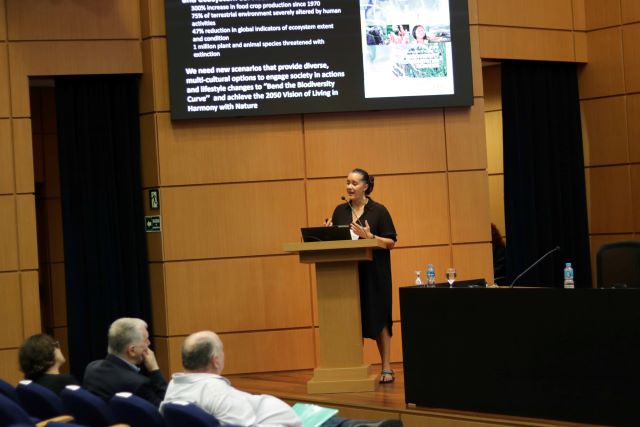

Pereira has conducted research in South Africa, Mozambique, Nigeria, Kenya, Colombia and Brazil (photo: Felipe Maeda/Agência FAPESP).
Laura Maureen Pereira delivered the Seventh 2023 FAPESP Lecture on “Why we need transformative scenarios for people and nature”.
Laura Maureen Pereira delivered the Seventh 2023 FAPESP Lecture on “Why we need transformative scenarios for people and nature”.

Pereira has conducted research in South Africa, Mozambique, Nigeria, Kenya, Colombia and Brazil (photo: Felipe Maeda/Agência FAPESP).
By José Tadeu Arantes | Agência FAPESP – The construction of a new way of conceiving of the relationship between people and nature so that there can be a future, and a desirable one, was the central theme of the Seventh 2023 FAPESP Lecture, delivered at FAPESP in São Paulo, Brazil, on October 27 by Laura Maureen Pereira, a researcher at Wits University’s Global Change Institute in South Africa.
Pereira has conducted research in Mozambique, Nigeria, Kenya, Colombia and Brazil. Her talk was entitled “Why we need transformative scenarios for people and nature: operationalizing the Nature Futures Framework”. She presented a positive multidisciplinary vision of ways to surmount the current crisis and promote the coexistence and sustainability of ecosystems and societies.
She began by proposing a thought experiment. “Close your eyes and think of where we are right now in 2100. What would São Paulo look like if we got things right?” she said. Contrasting the desirable future we can imagine and today’s increasingly frequent fires, floods, heatwaves, hurricanes, mass extinction and “Mad Max Fury Road” kinds of human behavior, she spoke of the need to cultivate the ability to imagine.
“Before we can think of pathways, interventions, or the things we need to do, we must build our capacity to envision where we want to go and what these transformed futures could be like,” she said.
She then described the work being done by the Intergovernmental Science Policy Platform on Biodiversity and Ecosystem Services (IPBES), an independent body established in 2012 to strengthen biodiversity conservation and use for long-term human well-being and sustainable development. It is not a United Nations body, but the UN Environment Program provides secretarial services, and it now has 145 member states.
A methodological assessment conducted by IPBES in 2016 concluded that while scenarios are available and are useful policymaking support tools, most are developed to assess not biodiversity but climate change, and few detail “positive” futures. They are generally limited to assessing impacts on nature and tend to be negative. Different policy and management responses relating to nature are not well represented.
In another global assessment published in 2019, IPBES emphasized the need for new scenarios that provide diverse multicultural options to engage society in lifestyle changes and actions to reverse the decline in biodiversity and move toward harmony between humans and nature by 2050.
“So IPBES set up an expert group to establish a new Global Scenarios Framework that would be nature-centric, and would be positive in terms of providing direction for futures we want, while recognizing the existence of different worldviews, knowledge systems and ways of valuing nature,” Pereira said.
The eventual outcome was the Nature Futures Framework (NFF), “a flexible tool to support the development of scenarios and models of desirable futures for people, nature and Mother Earth”, according to IPBES’s definition.
Three ways of valuing nature are arranged in a triangle. In the “nature as nature” perspective, people view nature as having intrinsic value, focusing on the diversity of species, habitats, ecosystems and processes that form the natural world, and on nature’s ability to function autonomously.
“Nature as culture” emphasizes oneness with nature, where relational values in societies, cultures, traditions and faiths are intertwined with nature in shaping diverse biocultural landscapes. Lastly, “nature for society” highlights the utilitarian benefits and instrumental values that nature provides to people and societies.
Circles associated with each perspective blend together where they intersect, indicating that they are not mutually exclusive and that human-nature relationships may be perceived in many different ways, according to people's knowledge systems and worldviews.
Pereira recalled the timeline for development of the NFF, “which was refined in meetings and workshops held in different countries and online dialogues during the pandemic”. She displayed pictorial representations created by artists belonging to cultural traditions in Asia, Africa and the Americas, stressing that the initiative is characterized by a multicultural vision, inclusion of Indigenous cultures, and valorization of local knowledge. The NFF will be translated into scenarios in the next two years.
Pereira described several possible global and local applications of the NFF. Before opening for questions and answers, she noted an emblematic quotation from The Economist (2011): “Humans have changed the way the world works. Now they have to change the way they think about it too.”
The event was attended by Marcio de Castro, FAPESP’s Scientific Director, and was chaired by Carlos Alfredo Joly, Professor Emeritus at the State University of Campinas (UNICAMP) and a former member of the steering committee for the FAPESP Research Program on Biodiversity Characterization, Conservation, Restoration and Sustainable Use (BIOTA-FAPESP).
A recording of the Seventh 2023 FAPESP 2023 Lecture, “Why we need transformative scenarios for people and nature: operationalizing the Nature Futures Framework” can be watched at: www.youtube.com/watch?v=T8CUrZTpp9U.
Republish
The Agency FAPESP licenses news via Creative Commons (CC-BY-NC-ND) so that they can be republished free of charge and in a simple way by other digital or printed vehicles. Agência FAPESP must be credited as the source of the content being republished and the name of the reporter (if any) must be attributed. Using the HMTL button below allows compliance with these rules, detailed in Digital Republishing Policy FAPESP.





